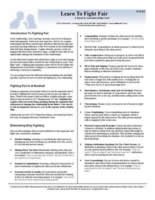All Couples Should Learn To FIght Fair. Here's How
Check out our mini-guide on how to fight fair, and stop letting badly handled conflict cause pain in your relationships. Download it NOW!
Search Our Network Of Business and Personal Development Sites
|
Work911 - Help @ Work Success File - Know Your Role. How 'Bout Their Roles? Robert Bacal is a noted author, keynote speaker, and management consultant. His most recent books include Performance Management - A Briefcase Book, and The Complete Idiot's Guide To Dealing With Difficult Employees. The Work911 Supersite contains many more free articles and tips on a number of workplace topics. Access it at www.work911.com . Robert can be contacted via e-mail at ceo@work911.com or by phone at (204) 888-9290. It seems pretty obvious that employees need to know what their own jobs require -- their roles, responsibilities and authority levels. We don't expect people to do their jobs effectively if they don't know what they are supposed to be doing. However, one area that people tend to ignore is how well employees understand what OTHER PEOPLE DO in their organizations. Why might that be important? Recently, I was doing some training in customer service and defusing hostile customers for a fairly large organization. A constant theme kept emerging (and it's quite common). A customer would call in with some sort of difficulty or problem, and the person answering the phone would transfer the caller to someone else. Unfortunately, the next person taking the call was not the right person, or was unavailable, leaving the customer to leave voice mail, or once again, get shuffled to someone else. Often the frustrated customer would end up calling the first person back to holler at them. How does this happen? Are employees stupid? Or perhaps can't be bothered? Probably not. They simply lack the information they need to provide good quality customer service to callers. And what's the outcome? First, angry customers. Second, stress and frustration on the part of staff caught in this shuffle. Third, some terrible inefficiencies for the organization itself, which impacts the bottom line. The problem is that we don't educate staff in the "bigger picture". In this case, that bigger picture relates to what other people do, their various expertise, and the relationship of other employee's jobs to each other. Before we talk about specific "fixes", consider this. It's very rare that employees work is independent of the work of other people in their workplaces. These days, getting jobs done has become more complicated, where the ability to get something accomplished often involves cooperation with others, or some degree of teamwork. Customer service aside, workplaces where people understand their own jobs and the jobs of others (like how the whole puzzle fits together) are going to be more effective and more productive. Helping People Understand The Larger Puzzle New employees should be oriented and educated not just about their own jobs, but about what other people do, and who to talk to when faces with different kinds of situations. They need to know who has decision-making power, and who has expertise they may need. That's far more important than knowing where the washrooms are (well, that's debatable!). Workplaces are constantly changing. Responsibilities change, and so do job roles. Management should take an active role in keeping employees up to date about changes that affect not only their own jobs, but the jobs and roles of others. This is even more important in team based and project based environments. Regular staff meetings can be used to do this in an ongoing way, and need not be time intensive. Often, staff updates can take only a very few minutes. Here's the most important part. And this applies to every employee. Employees tend to hesitate about asking too many questions, for fear of looking stupid or being perceived as a nuisance. They rely on the human resources department or their supervisor to tell them what they need to know. Unfortunately, supervisors don't always know what employees need to know, or haven't thought about it, and they can't read minds. So, it's important that employees take on responsibility for their own understanding of what other people do. Employees! Listen up! ASK! You can't do your job well if you don't know your own role and what other people do. You can't do your job if you don't know where to refer a customer with a particular problem. Let's end this by listing some things that people should know:
The nice part about all this is that it isn't rocket science, but it is neglected. Human resources, managers and employees can all take responsibility and make sure that employees know and understand their own job responsibilities and roles, and those of others who fit into the completed "puzzle" of getting things done effectively and efficiently.
|
 Manage Conflict - Resolve Conflict - Prevent Conflict
Manage Conflict - Resolve Conflict - Prevent Conflict 

